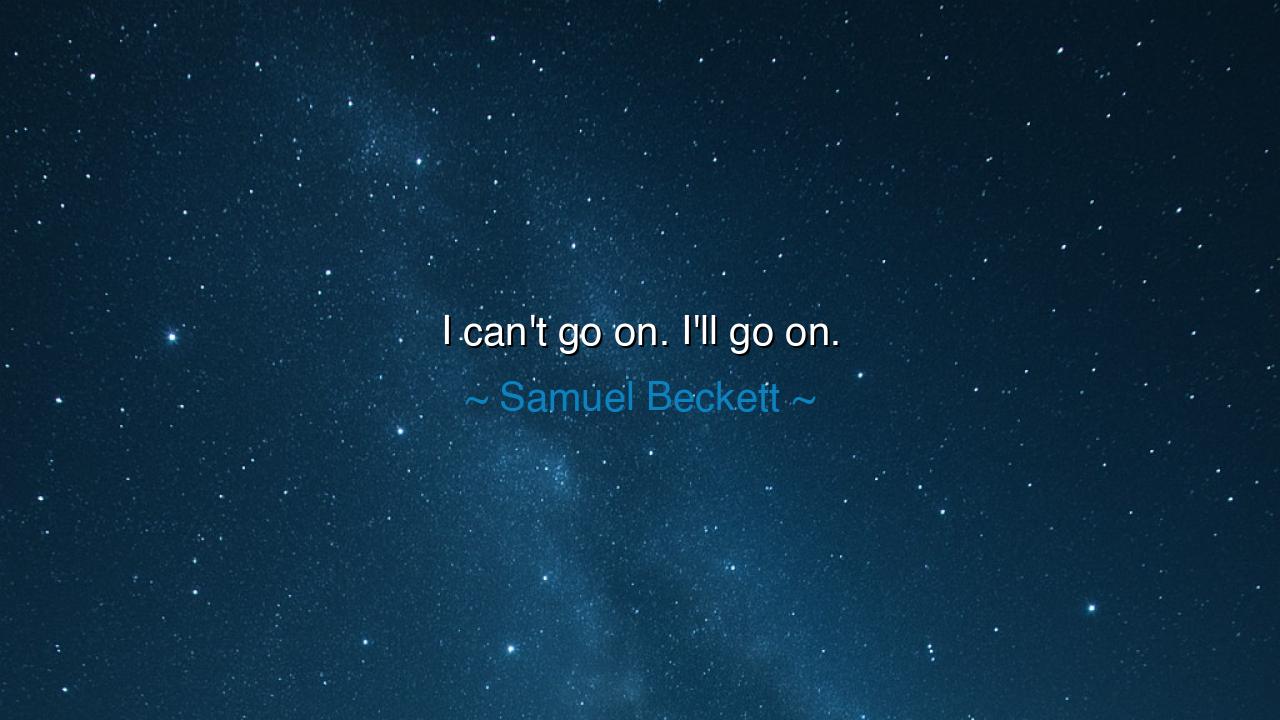
I can't go on. I'll go on.






Samuel Beckett, poet of silence and chronicler of despair, gave the world a line as stark and immortal as stone: “I can’t go on. I’ll go on.” In this contradiction lies the very rhythm of existence. It is the cry of the soul crushed under the weight of suffering, confessing its limits, and yet in the same breath, affirming its will to endure. It is the hymn of humanity itself: frail, wounded, despairing—yet rising, refusing to be extinguished.
The ancients would have recognized this paradox. For in the tragedies of Sophocles and Aeschylus, heroes often proclaimed their despair to the heavens. Oedipus, blinded and broken, declared there was no reason to live, yet he walked onward into exile. Prometheus, bound in torment, confessed his agony, yet endured still. In each case, despair was real, yet it did not end the story. This is what Beckett captures in modern form: the human voice admitting defeat, but in the same breath choosing defiance. Despair and perseverance intertwine, and from their tension comes endurance.
Consider the soldiers of Dunkirk in the Second World War. Surrounded, outnumbered, abandoned by fortune, many believed they could not go on. And yet, by courage and endurance, they held, they escaped, and they turned despair into survival. Their story embodies Beckett’s words: “We cannot continue—and yet we will.” In the gap between these two truths lies the unyielding mystery of the human spirit.
This phrase is also deeply personal, for Beckett himself knew the shadows of despair. He wrote in the aftermath of war, amidst ruins, poverty, and disillusionment. His words were not the voice of one who had known only triumph, but of one who had stared into the void and yet continued to create. He shows us that the will to continue does not come from certainty, but from the stubborn refusal to let despair write the final line.
To say “I can’t go on” is to confess humanity. To say “I’ll go on” is to declare heroism. Many believe heroism is the absence of weakness, but Beckett teaches the opposite: heroism is weakness endured, weakness faced, weakness carried into tomorrow. It is precisely when we believe we cannot continue that the decision to continue has its greatest power.
The lesson is profound: when the soul despairs, do not wait for strength to return before moving forward. Step forward in weakness, in uncertainty, in trembling, for that step itself is the act of triumph. It is not necessary to feel capable in order to endure. What is necessary is only to choose, in the face of despair, to go on. In this choice, the human spirit proves its unbreakable fire.
Practical action flows from this truth: When you feel you cannot continue—whether in grief, in toil, in hardship—whisper Beckett’s words: I can’t go on. I’ll go on. Speak them not as denial, but as defiance. Allow yourself to feel despair, but do not let despair end your journey. Take one step, then another, however small. For in that act, you join the great chorus of humanity that has endured through wars, plagues, losses, and darkness. Beckett’s wisdom is this: to endure is not to be unbroken, but to continue even while broken. That is the essence of life’s triumph.






AAdministratorAdministrator
Welcome, honored guests. Please leave a comment, we will respond soon